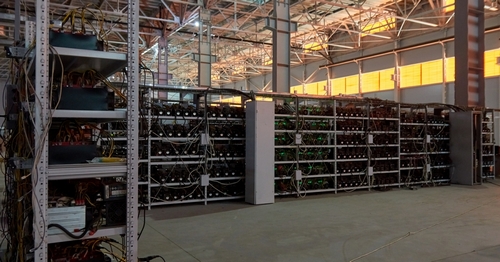On Thursday, the bitcoin and blockchain technology firm announced a new mining wing, Blockstream Mining, along with a BetterHash-based mining pool, Blockstream Pool. Led by cryptographer Dr. Adam Back, Blockstream is best known for its bitcoin-sidechain ecosystem, the Liquid Network.
Blockstream has launched a colocation mining service and already counts the Fidelity Center for Applied Technology and LinkedIn founder Reid Hoffman as customers.
Blockstream Mining will host colocation services across North America with its most recent installation in Georgia. The announcement stated that 300 megawatts, or 300,000 kilowatt-hours of energy, will be made available to customers.
That level of energy supply would be able to power up around 100,000 more-advanced ASIC mining models such as MicroBT’s WhatsMiner M20S or Bitmain’s AntMiner S17 Pro.
These machines on average have an electricity consumption of about 3 kWh per unit with a hashing power of around 55 terahashes per second. That could add about six exhashes per second to bitcoin network’s computing power (1 exhash = 1 million terahash).
Blockstream says its self-mining efforts currently make up one percent of the global bitcoin hash rate. The future relationship between Blockstream’s self-mining and Blockstream Mining was not specified.

Blockstream CSO Samson Mow says the firm’s mining efforts, even before the latest launch, were largely based on concerns about the network’s future:
“We began self-mining back in 2017 after being motivated by widespread concern that mining decentralization was declining. At the time it appeared that parties involved in ASIC manufacture, hosting, and pool operations were becoming a centralizing force and holding back Bitcoin from reaching its full potential. We figured we could use our Bitcoin expertise to improve the situation.”
In this vein, Blockstream also announced the launch of Blockstream Pool running the BetterHash mining protocol. Introduced in 2014 by Blocskstream project OpenHash, BetterHash decentralizes mining pool decisions, such as which block to mine, to individual owners. Proponents argue it further decentralizes and democratizes bitcoin mining.
Blockstream Pool is the graduate of a one-year testnet and is available to Blockstream Mining customers. As of now, Blockstream Mining is exclusive to enterprises and institutions.
Blockchain Firm Helps Congo Mine to Fight Against Blood Diamonds
Berlin-based blockchain company, RCS Global delivers mine-to-market technology solutions to help fight against conflict minerals in the Democratic Republic of Congo.
Not part of a blood-stained supply chain
On Oct.1 Reuters reported that government officials in the Societe Miniere de Bisunzu’s (SMB) mine in Congo are using blockchain technology to assure its clients that the minerals they purchase are not part of a blood-stained supply chain.
RCS Global started implementing its blockchain technology solutions at the beginning of 2019 that lets the SMB mine officials digitally tag its minerals. RCS managing director Ferdinand Maubrey said:
“It allows purchasers of SMB material to be sure that it actually comes from that mine site and is not smuggled into the supply chain from other mines, as much as possible.”
Today, mines rely mostly on paper-based certification system, which is prone to corruption. Maubrey said that the new RCS Global system helped prevent tainted minerals from being mixed with SMB’s clean and traceable minerals by creating new obstacles, adding:
“To use stolen tags, for example, a smuggler would also need to steal both the scanner and the laptop linked to it – which Maubrey said would be easily detected.”
Despite the fact that this is one step in the right direction, SMB chief executive Ben Mwangachuchu pointed out that digital systems can still be corrupted “if the government agents who tag bags conspire with smugglers to enter incorrect data from the outset.” He added:
“If they collude and say we are going to feed the information we want … for our own benefit, you will never know.”
New Balance uses blockchain to confirm product authenticity
Cointelegraph previously reported that Charles Hoskinson, CEO of blockchain engineering startup IOHK, announced that American footwear brand New Balance will use the Cardano blockchain to allow its customers to verify the origins of a range of products.


